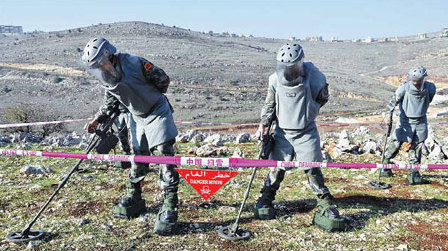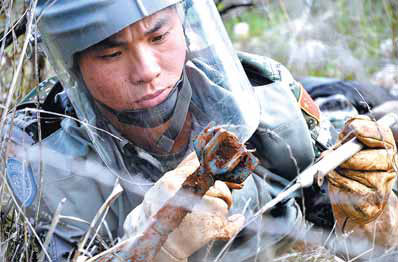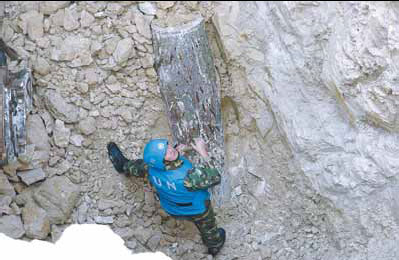Chinese soldiers clear mines, win hearts
Updated: 2013-04-22 07:23
By Hu Yongqi in Yunnan (China Daily)
|
||||||||
|
Chinese peacekeepers of the United Nations Interim Force in Lebanon participate in a minesweeping mission. Li Qiang / for China Daily |
|
A Chinese peacekeeper tries to defuse a bomb. Li Qiang / for China Daily |
|
A Chinese peacekeeper unearths a bomb. Provided to China Daily |
Dangerous job earns gratitude from the people of Lebanon
One week after returning from Lebanon to his base in Yunnan province, Chen Dairong was still struggling with jet lag from the six-hour time difference. However, the colonel in the Chengdu Military Area Command showed no less enthusiasm when it came to teaching soldiers to clear landmines.
For the past nine months, Chen has led an engineering battalion sent by China to demine the Lebanese border with Israel, where thousands of landmines were left after the conflict between those countries in 2006.
Since that year, when he went on his first peacekeeping mission in Lebanon, Chen has encountered many perilous scenarios.
He was once assigned to escort supply trucks on their way to aid Indian peacekeeping soldiers. On the trip, the trucks stopped suddenly as there were two bombs in their way. Knowing the Indian soldiers urgently needed supplies, Chen didn't hesitate to jump out of the truck and defuse the bombs while everybody else retreated to safety.
"My experience told me the bombs would blow up if I touched the detonator," he recalled. "It was horribly quiet, and I could hear my heartbeat."
After an anxious 20 minutes, the other soldiers were thrilled to see Chen defuse the bombs.
"Then I sighed for a long time as my clothes were soaked in sweat. You can imagine how nervous I was," he said.
The 11th International Day of UN Peacekeepers falls on May 29 to commemorate the contribution of peacekeeping soldiers to the safety of conflict-prone countries.
Chen, who has been dispatched to Lebanon to perform UN peacekeeping missions three times, is one of the 1,342 Chinese soldiers that have been sent to Lebanon in the past seven years.
During that time, Chinese soldiers participating in six peacekeeping missions in Lebanon have cleared 1.96 million square meters of land on which mines were suspected to have been laid. The soldiers detected and disposed of 3,063 landmines and 15,673 unexploded pieces of ordnance. They also built 320 km of highway and provided medical service to 20,000 residents.
"The peacekeeping soldiers have shown their determination to safeguard peace for the world, especially in conflict areas. They have set an outstanding example for Chinese soldiers to win honor by providing international assistance. Their conduct should be encouraged," said Zheng Daoguang, deputy director of the political department of the Chengdu Military Area Command, one of the eight military zones on the Chinese mainland.
'Dancing on a blade'
"Many soldiers asked me whether I was frightened during the operation. I always said I was afraid, because demining is like dancing on a blade," Chen said.
An adept minesweeper for more than 30 years, he had detected and disposed of 2,150 landmines by the end of last year. His reputation makes him an indispensable member of peacekeeping missions.
At the request of the United Nations and with the approval of the Central Military Commission, the Chinese peacekeeping engineering battalion to Lebanon was formed in March 2006 from an engineering regiment stationed at Yunnan province. It was the first group of peacekeeping soldiers China sent to a Middle Eastern country.
In the 1990s, the regiment swept for mines at the China-Vietnam border and was then sent to Eritrea and Thailand, where it was also tasked with teaching demining techniques. By this time, Chen Dairong was already a minesweeper of repute.
As part of the United Nations Interim Force in Lebanon, the battalion performed other missions besides minesweeping, such as defense works, humanitarian aid and the construction and maintenance of roads.
UNIFIL, which has been stationed in Lebanon since 1977, has a rule that all its soldiers must obtain a demining license. However, some Chinese soldiers did not get the license before arriving in Lebanon, so Chen took it upon himself to organize the team and write a book of standard operating procedures.
His team would often study until 2 am or 3 am after a 10-hour day of demining - their request to learn demining techniques from Ukrainian soldiers was denied on intellectual property grounds,
During the conflict between Lebanon and Israel, soldiers worked half-naked in shelters where the temperature was as high as 50 C. With the help of UN forces and the Lebanese government, Chinese soldiers finished editing their 272-page procedure book in six months, two and a half years before the Ukrainian soldiers.
All 275 soldiers went on to pass the demining test, becoming the first Chinese soldiers to get an international demining license.
"After the project, we left behind hundreds of instant noodle boxes and 20 kg of used paper," Chen said.
Cao Engui, a 28-year-old soldier who had been to Lebanon five times and returned home last month, said the soldiers didn't practice on the front line before going to Lebanon in 2006. "I was nervous when I found my first landmine, because real landmines were not used in minesweeping training," Cao said.
Calling home from Lebanon cost as much as 14.6 yuan ($2.30) per minute, so soldiers turned to an older form of communication - letters. Cao said he learned from his training and developed more confidence after getting the UN license.
"Father and mother, please take it easy. Demining sounds very dangerous but we have advanced facilities and well-organized operation procedures to ensure safety," he wrote in a letter to his parents in Sichuan province.
Huang Aiyu, who commanded the battalion last year, said his unit had helped consolidate the cease-fire line between Lebanon and Israel by erecting nine boundary markers in 2012. The unit also detected 35 landmines, mostly of the anti-tank variety.
Building friendship
Humanitarian aid is another major task for peacekeeping soldiers. Many soldiers said they not only represent the Chinese army but also the Chinese people, therefore their goal was also to make friends with the Lebanese people and give them a helping hand.
Rap Racine, a fruit grower in Tyre, the fourth-largest city in Lebanon, did not sell the first oranges from his harvest last year. Instead, he gave them to Chinese soldiers as thanks for their efforts in cleaning unexploded cluster bombs on his farm.
During the Israel-Lebanon conflict, bombs were dropped over Racine's orchard, and a number of smaller explosives lodged in the branches of his orange trees. Racine was terrified when he heard the small bombs would, if touched improperly, ruin the trees that were the main source of income for his family.
Tang Shangping, then-commander of the Chinese peacekeeping soldiers, ordered his men to remove the cluster bombs.
"The small bombs in the trees were really hard to dispose of. If we shook the branch, the bombs would explode. So, we had to make sure the trees didn't quiver while we got rid of the small bombs," said minesweeper Li Hu, another soldier who just returned from Lebanon.
In Tyre, former commander Huang and his soldiers routinely gave lectures on how to handle landmines and emergency treatment. Huang frequented an orphanage built by the International Red Cross to give lectures on demining and Chinese medicine. About 90 percent of the 1,000 children at the orphanage had lost their parents in the conflict.
"The kids really like Chinese soldiers and play games with them. We are planning to sponsor 50 Lebanese kids to come here this year to see the real China," said Huang.
In addition, Chinese soldiers provided medical services for 5,300 locals, about 90 percent of the 6,000 people in the three towns neighboring the Chinese soldiers' camp.
As the interactions deepened, Huang and his soldiers gained the locals' trust. "When I visited the city council of Tyre, the chairman gave me three kisses on the cheek and forehead, which is the highest courtesy in Lebanon," Huang said with pride.
Li Yingqing, Guo Anfei, Ling Tao and Liu Song contributed to this story.
huyongqi@chinadaily.com.cn
(China Daily 04/22/2013 page6)

 Obama celebrates young inventors at science fair
Obama celebrates young inventors at science fair
 Earth Day marked around the world
Earth Day marked around the world
 Volunteer team helping students find sense of normalcy
Volunteer team helping students find sense of normalcy
 Ethnic groups quick to join rescue efforts
Ethnic groups quick to join rescue efforts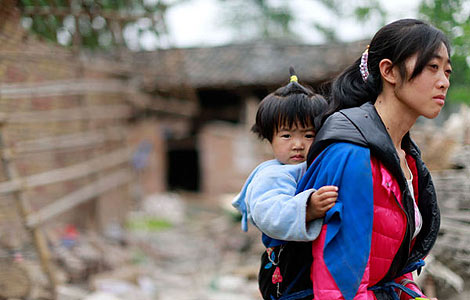
 Earthquake leaves family shattered
Earthquake leaves family shattered
 Boston Marathon bombing suspect charged
Boston Marathon bombing suspect charged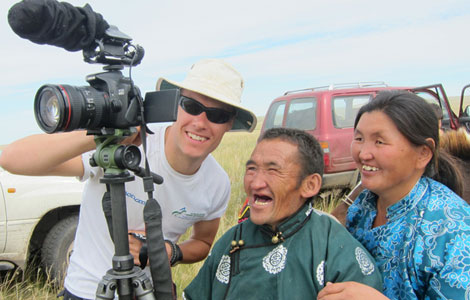
 Chasing vestiges of the Great Wall
Chasing vestiges of the Great Wall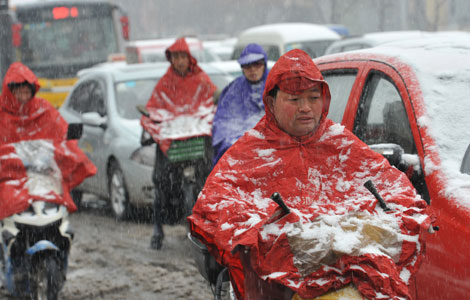
 Weekly Photos: April 15-21
Weekly Photos: April 15-21
Most Viewed
Editor's Picks

|

|

|

|

|

|
Today's Top News
Russia criticizes US reports on human rights
China 'aims to share its dream with world'
Chinese president appoints 5 new ambassadors
Nation's IPR suits see spike in 2012
H7N9 not spread between humans: WHO
Health new priority for quake zone
Sino-US shared interests emphasized
China, ROK criticize visits to shrine
US Weekly

|

|
